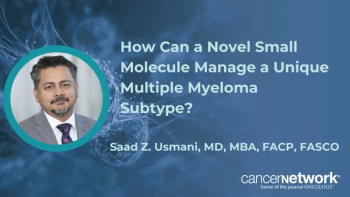
FDA Approves Loncastuximab Tesirine in Patients with R/R Large B-Cell Lymphoma
Data from the phase 2 LOTIS-2 clinical trial supported the accelerated approval of loncastuximab tesirine for patients with relapsed or refractory large B-cell lymphoma.
The FDA has granted accelerated approval to loncastuximab tesirine-lpyl (Zynlonta) as therapy for patients with relapsed or refractory large B-cell lymphoma following 2 or more prior lines of therapy, including diffuse large B-cell lymphoma (DLBCL) not otherwise specified, DLBCL arising from low-grade lymphoma, and high-grade B-cell lymphoma, according to ADC Therapeutics, the developer of the agent.1
The decision by the FDA is based on data from the pivotal phase 2 multi-center, open-label, single-arm, LOTIS-2 clinical trial (NCT03589469), evaluating the efficacy and safety of the antibody-drug conjugate (ADC) in patients with relapsed or refractory DLBCL following 2 or more lines of prior therapy (n = 145).
“There is a significant unmet need for treatment options for patients with r/r DLBCL, including those who have been heavily pretreated and have difficult-to-treat disease,” Paolo F. Caimi, MD, University Hospitals Cleveland Medical Center and Case Comprehensive Cancer Center, Case Western Reserve University, said in a press release. “Single-agent Zynlonta demonstrated clinically important outcomes in the pivotal LOTIS-2 study across several disease subtypes. Notably, this included transplant eligible and ineligible patients and patients who previously received stem cell transplant or CAR-T cell therapy.”
Loncastuximab tesirine demonstrated an objective response rate (ORR) of 48.3% and a complete response rate of 24.1%. The median duration of response in 70 responders was 10.3 months, with a median time to response of 1.3 months
Data from the trial were previously reported at the American Society of Hematology Annual Meeting and Exposition.2 In high-risk groups, durable responses were seen, including 6 out of 13 patients (46.2%) with progression following chimeric antigen receptor T-cell therapy, 5 out of 15 (33.3%) with double- or triplet-hit lymphoma, and 13 out of 29 (44.8%) with transformed DLBCL.
The toxicity profile was manageable with the most common grade 3 or higher treatment-emergent adverse events observed being neutropenia with a low incidence of febrile neutropenia, thrombocytopenia, gamma-glutamyl transferase increase, and anemia.
“The FDA approval of Zynlonta is an exciting advancement for patients with r/r DLBCL and a transformational event for ADC Therapeutics,” Chris Martin, Chief Executive Officer of ADC Therapeutics, said in a press release. “We extend our deepest gratitude to the patients who participated in our LOTIS-1 and LOTIS-2 clinical trials, their families, the study investigators and our employees, as their commitment made this important milestone possible.”
Loncastuximab tesirine is a CD19-directed ADC designed to bind irreversibly to DNA to create highly potent interstrand cross-links that block DNA strand separation, therefore disrupting essential DNA metabolic processes such as replication and ultimately resulting in cell death.
Prior to its approval,
Loncastuximab tesirine is also being evaluated in LOTIS-3 (NCT03684694), a phase 1/2 clinical trial in combination with ibrutinib (Imbruvica) in patients with relapsed or refractory DLBCL or mantle cell lymphoma, as well as LOTIS 5, a phase 3 confirmatory clinical trial in combination with rituximab (Rituxan) in patients with relapsed or refractory DLBCL.
References
1. ADC Therapeutics Announces FDA Approval of ZYNLONTA™ (loncastuximab tesirine-lpyl) in Relapsed or Refractory Diffuse Large B-Cell Lymphoma. News release. ADC Therapeutics SA. April 23, 2021. Accessed April 23, 2021. https://bit.ly/3eoY1l7
2. ADC Therapeutics Announces Updated Clinical Data on Lead Antibody Drug Conjugate Programs Loncastuximab Tesirine (Lonca) and Camidanlumab Tesirine (Cami) Presented at 62nd American Society of Hematology Annual Meeting. News release. ADC Therapeutics SA. December 7, 2021. Accessed April 23, 2021. https://bwnews.pr/3gAGDfJ
Newsletter
Stay up to date on recent advances in the multidisciplinary approach to cancer.





































